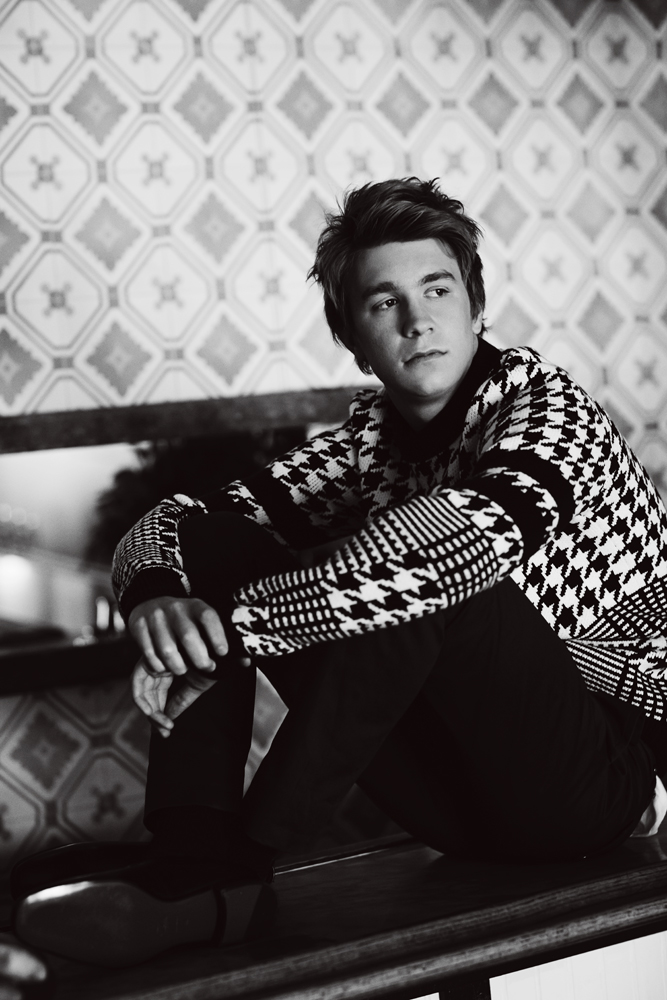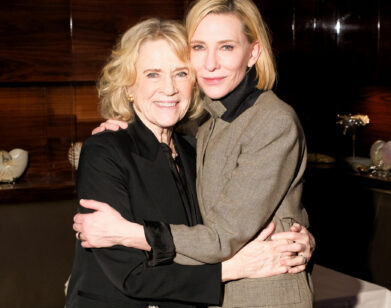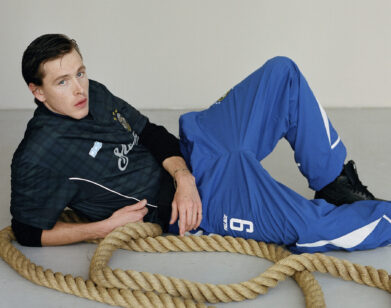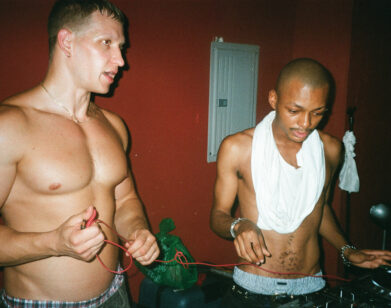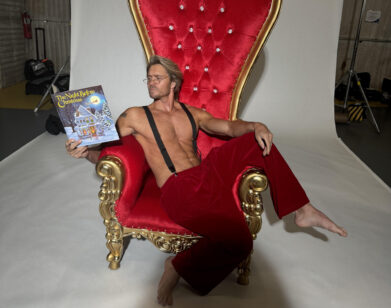Mann About Sundance
THOMAS MANN AT L&E OYSTER BAR IN SILVERLAKE, LOS ANGELES, DECEMBER 2014. PHOTOGRAPHY: GUY LOWNDES. STYLING: SEAN KNIGHT. GROOMING: DANIELE PIERSONS FOR EXCLUSIVE ARTISTS MANAGEMENT USING ORIBE HAIR CARE.
Thomas Mann’s upcoming filmography is a little overwhelming. Although the 23-year-old actor has only appeared in a handful of films to date, he has 10 films currently awaiting release. There’s Welcome to Me with Kristin Wiig, and The Preppie Connection, which recounts the barely-believable true story of a cocaine smuggling ring at a New England prep school.
The two films Mann is most excited about, however, are probably The Stanford Prison Experiment and Me & Earl & the Dying Girl. Both are set to premiere at Sundance next week and feature impressive young casts. In The Stanford Prison Experiment, based on the infamous ’70s psychological experiment by Philip Zimbardo, Mann is part of an ensemble alongside Michael Angarano, James Frecheville, Ezra Miller, Tye Sherdian, Callan McAuliffe, Ki Hong Lee, and Billy Crudup. In Me & Earl & the Dying Girl, Mann stars as an aspiring filmmaker with Connie Britton as his mother, Nick Offerman as his father, and Olivia Cooke as the titular dying girl.
Born in Portland and raised in Dallas, Texas, Mann’s first role was a court jester in his sixth grade production of Sleeping Beauty. “I taught myself to do a backflip and walk on my hands, just as a random talent,” he explains over the phone from his home in Silverlake, L.A. “They needed someone, so I went to the theater director’s office and I said, ‘I think I’m perfect for it.'” Mann was hooked and his other extracurricular activities—swimming, hockey, participating in triathalons—fell to the side. By the time he moved to Los Angeles at the age of 17, he was a successful commercial actor in and had guest-starred on one episode of Nickelodeon’s iCarly.
EMMA BROWN: You’re in a million movies coming out.
THOMAS MANN: Yeah. You don’t want to talk about all of those, trust me. Me & Earl & the Dying Girl is probably the one I can talk the most about sincerely.
BROWN: Why are you so excited about it?
MANN: It’s the greatest role that has ever come across my lap. I read it a year and a half before I even auditioned. I knew that I wanted to do it when I read it. It sounded like me. Sometimes you just read something and it makes sense and it clicks instantly and you feel connected to it and you have an emotional response to it immediately. That’s how I was when I read Me & Earl & the Dying Girl. I made the tape a little over a year ago—the day after Christmas. They brought me in for casting and I read for the producer and then I read for [director] Alfonso [Gomez-Rejon]. Then they brought me in with Olivia Cooke, who plays the dying girl. That was our first chemistry read and it went so well and me and Olivia were so excited about it afterwards that we went out in the hall and jumped around and hugged each other. We were like, “Oh, this is great! We’ve got the part!”
Weeks went by and they were reading other people, but me and Olivia were still hanging out; we’d still sit down and talk about the script. We’d basically decided that the parts were ours before we’d been cast. Finally we had one last screen test and it was me and Olivia and a couple of other actors and we got the parts. It was one of those things where you have this feeling about it—we both wanted it so bad. Then the experience of making the movie was incredible. Alfonso is just a master of his craft. He’s the greatest captain we could’ve had on the whole project. He uses the camera like a paintbrush. I don’t know if you’ve seen any of his work on American Horror Story, but he’s constantly thinking of a way to make a scene better and more interesting visually, but also emotionally. It’s crazy. A lot of directors are either more focused on the technical aspects of it or more focused on the characters and the story, and Alfonso seems to have mastered both and intertwines them together and makes it feel very effortless. He has this magical quality about him.
BROWN: What makes someone a good director?
MANN: Maybe just the ability to see the truth in a situation. I spent a lot of time talking to Alfonso about his style of directing and what goes through his head on set. There was the day on set—the last day of shooting—and it was a long, long day, maybe a 16 or 17 hour day. We were shooting in the hospital and it was probably the most emotional scene in the film. We started shooting it and it was just going slow; we kept having problems with the camera and things kept going wrong. Eventually Alfonso walked away for about 15 minutes. Everyone was like, “Where’s Alfonso? We have to shoot something.” We didn’t really have a plan and we had so much left to shoot. It wasn’t feeling good; no one was happy and that’s not how you want to feel on your last day of shooting. Finally he came back and was like, “Okay, I know what we need to do. I was trying too hard to make the scene something that it wasn’t. I need to just document what’s happening; I want to find the truth of the scene and not try to force anything.”
I learned a lot from that basic notion that you’re constantly looking for the truth. I like the way he thinks about the organic nature of a scene and how it should play out. He would always let us block the scenes—me and Olivia would come to set and he’d be like, “Okay, show me what you want to do.” He would guide it a bit, but he would mostly let us block it and rehearse it ourselves and then he would figure out how to shoot it, which, as an actor, is really liberating and cool.
BROWN: Was Alfonso more accessible than some of the other director’s you’ve worked with?
MANN: On a movie like this, it forces you to become really, really close with your director. I had to trust him and he had to trust me, because I give so much of myself in this film—it’s not a passive thing. So I was constantly talking to him about what he’s thinking or what we’re both trying to get out of the scene and the kind of movie that we want to make, and I think that we agreed on a lot of that stuff. It was one of the closest working relationships I’ve ever had, but it was for the better and I think it made it something really special. I think we both feel very strongly, really proud of the movie we made.
BROWN: Do you come from an artistic family?
MANN: Yes and no. My mom is a really great writer. She’s had different jobs working as a copywriter in different marketing departments and advertising. My dad, on the visual side, is really great with his hands and builds stuff—he’s woodworker and he paints. It doesn’t have to do with his career necessarily; he’s a construction project manager, which isn’t quite as creative. There’s never been an actor in my family. No one’s ever worked in the industry.
BROWN: Do you watch a lot of movies in your free time?
MANN: I watched a lot of movies for Me & Earl & the Dying Girl. It totally expanded my knowledge of movies. I now watch things from the ‘40s through the ‘70s, the French New Wave stuff—Truffaut and Godard. All the stuff that I didn’t really know about until this movie came along. The characters in the movie are remaking all these classic movies that you would see in the Criterion Collection, so I wanted to kind of know where they were coming from and what they loved about all these old movies. I spent a lot of time watch movies before we started shooting. There are so many references to things in the film, so many homages to different directors and obscure films because Alfonso just loves cinema. I think a cinephile can see Me & Earl & the Dying Girl several times and still pick up on something new every single time. That’s been fun for me.
BROWN: What’s your favorite film that you discovered through it?
MANN: Probably Don’t Look Now (1973) with Donald Sutherland and Julie Christie. It’s just a total mindfuck of a movie. It’s incredible.
BROWN: Are there any directors you particularly love—you’d be in any of their films, even as an extra?
MANN: Anything by Martin Scorsese. I would work Kraft services on any of his movies. Paul Thomas Anderson would be amazing. The Cohen Brothers. All of those directors know how to get a great performance out of their actors but their movies are still visually really entertaining too.
BROWN: I wanted to talk about The Stanford Prison Experiment as well. Are you a prisoner or prison guard? Was your character a real person? Did you have to do lots of research into their life?
MANN: I am a prisoner. It was based on a real person; my character is 416. There wasn’t a ton of materials to go on or interview footage that I had to look through to try and build the character. I watched the documentary that they did and you got that these were all just 20-something kids who were trying to make some money and didn’t really know what they were getting themselves into. I play someone who comes in in the middle of the experiment after everyone has already gone through this emotional trauma. I come at it not really knowing what was going on, and it was sort of like that when I got to set, too, because everyone else had already been shooting for a couple of weeks and I was just jumping into it without really any preparation.
BROWN: How was the mood on set? Was it intense?
MANN: It was actually really light-hearted. I’ve never worked with so many of my friends on a movie before in my life. It’s really everyone I’ve ever auditioned against. It’s just a bunch of young actors all around my age, so it was a party. It was like a summer camp – so many people on set all the time. It was actually hard to stay focused because we had all these inside jokes going on the whole time, but we ended up getting it done. I think it’s going to end up being a really intense, visceral movie, but the overall energy on set was pretty relaxed.
BROWN: Had you worked with any of the other cast members before?
MANN: One of them was from Texas—Logan [Miller], who I moved out to L.A. with. He was my roommate for my first few years out in L.A., but we had never worked together before, so that was really cool. Most people I just know through auditioning and through work. It’s a small world. Everyone kind of knows everyone.
BROWN: Has anyone involved in the experiment seen the film?
MANN: Philip Zimbardo’s wife came to the wrap party, so a bunch of us got to meet her and talk to her, and that was really interesting. She seemed to approved of what we were doing, but I don’t know if she’s the movie.
BROWN: Is everyone going to be at Sundance?
MANN: I think a lot of people are going just because they know it’s going to be a lot of fun and all their friends are going to be there. They’re getting us a big house I think, which should be fun…or terrible.
For more from the Sundance Film Festival 2015, click here.

